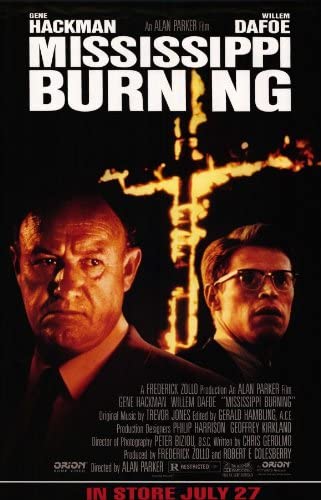Difference between revisions of "Mississippi Burning (1988)"
| Line 13: | Line 13: | ||
==Plot== | ==Plot== | ||
| − | Mississippi Burning was | + | The Mississippi Burning was established in 1964 when three civil rights workers were murdered by members of Ku Klux Klan in a small town. Two FBI agents, Willem Dafoe played Ward, he is an enthusiastic Harvard University graduate who held high positions in the Robert Kennedy Department of Justice. This reliable agent hopes to attract the attention of killers by making the city a target of national media attention. Gene Hackman performed at an active Oscar awards ceremony, playing the former Mississippi State Senator Anderson, his charm has won the trust of the deputy sheriff's dissatisfied wife. He claimed that her evidence holds the key to what actually happened to the three civil rights workers.[[File:MISSISSIPPI-BURNING-008.jpg|thumb|left|Gene Hackman and Willem Dafoe in Mississippi Burning]] |
==Controversy== | ==Controversy== | ||
| − | + | The film describes the way blacks were lynched, beaten and their houses and churches burned during the Civil War.<ref>https://www.spiritualityandpractice.com/films/reviews/view/6198</ref> It also shows many appalling (and roughly accurate) incidents of racist violence, and its narrative focuses on the significance of racial politics to white people.<ref>https://www.theguardian.com/film/2013/apr/10/reel-history-mississippi-burning</ref> | |
==Pro== | ==Pro== | ||
| − | It also | + | It also showed that FBI agents restrained and took legal proceedings under Anderson's instructions in order to identify the killer. This makes them as brutal and humane as their racist opponents. Mississippi Burning tried to illustrate a barbaric justice that has penetrated into American history but runs counter to the value of human rights and personal freedom.<ref>https://www.spiritualityandpractice.com/films/reviews/view/6198</ref> |
| − | [https://www.rogerebert.com/contributors/roger-ebert Roger Ebert] give this one 4 stars out of 5 And | + | [https://www.rogerebert.com/contributors/roger-ebert Roger Ebert] give this one 4 stars out of 5 And I have never seen other movies that capture the look, feel, and smell of racism so powerfully. In this movie, we can feel their hatred of racists, how to replace other entertainment methods, and how to make up for their sense of worthlessness. When the back of racism is broken, we can feel something freely breaking free and fresh air pouring in.<ref>https://www.rogerebert.com/reviews/mississippi-burning-1988</ref> |
==Reference== | ==Reference== | ||
Revision as of 03:55, 9 March 2021
Mississippi Burning is American biographical crime thriller who released on December 2, 1988 (Washington). This 128 minutes movie tells about two FBI agents Gene Hackman as Agent Rupert Anderson and Willem Dafoe as Agent Alan Ward investigating the murder of civil rights by Ku Klux Klan workers in the 1960s are trying to break the silence conspiracy in a small southern town where the black-and-white separation divides, based on The 1964 Murders of Chaney, Goodman, and Schwerner. It also starring
- Frances McDormand as Mrs. Pell
- Brad Dourif as Deputy Sheriff Clinton Pell
- R. Lee Ermey as Mayor Tilman
- Gailard Sartain as Sheriff Ray Stuckey
- Stephen Tobolowsky as Clayton Townley
- Michael Rooker as Frank Bailey
- Pruitt Taylor Vince as Lester Cowens
- Badja Djola as Agent Monk
- Kevin Dunn as Agent Bird
Contents
Plot
The Mississippi Burning was established in 1964 when three civil rights workers were murdered by members of Ku Klux Klan in a small town. Two FBI agents, Willem Dafoe played Ward, he is an enthusiastic Harvard University graduate who held high positions in the Robert Kennedy Department of Justice. This reliable agent hopes to attract the attention of killers by making the city a target of national media attention. Gene Hackman performed at an active Oscar awards ceremony, playing the former Mississippi State Senator Anderson, his charm has won the trust of the deputy sheriff's dissatisfied wife. He claimed that her evidence holds the key to what actually happened to the three civil rights workers.
Controversy
The film describes the way blacks were lynched, beaten and their houses and churches burned during the Civil War.[1] It also shows many appalling (and roughly accurate) incidents of racist violence, and its narrative focuses on the significance of racial politics to white people.[2]
Pro
It also showed that FBI agents restrained and took legal proceedings under Anderson's instructions in order to identify the killer. This makes them as brutal and humane as their racist opponents. Mississippi Burning tried to illustrate a barbaric justice that has penetrated into American history but runs counter to the value of human rights and personal freedom.[3]
Roger Ebert give this one 4 stars out of 5 And I have never seen other movies that capture the look, feel, and smell of racism so powerfully. In this movie, we can feel their hatred of racists, how to replace other entertainment methods, and how to make up for their sense of worthlessness. When the back of racism is broken, we can feel something freely breaking free and fresh air pouring in.[4]

